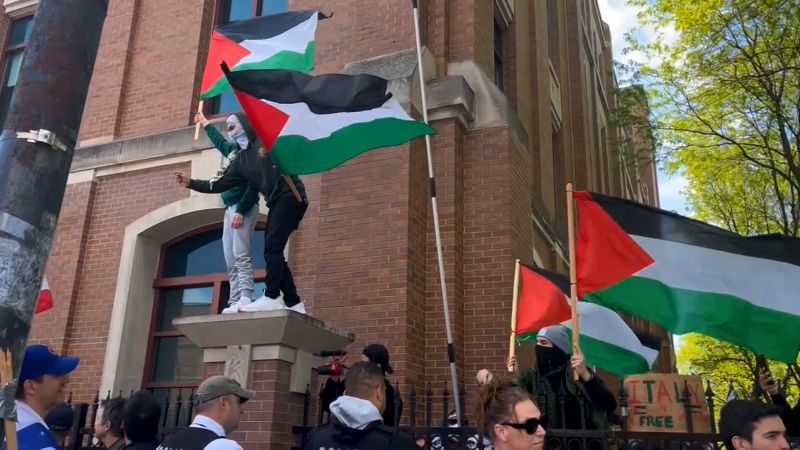The charges are piling up against former President Donald Trump — and his legal calendar is getting as crowded as the Republican primary schedule.
Trump was hit Thursday with a superseding indictment in the Mar-a-Lago documents case even as his lawyers were told to expect another indictment in an unrelated probe into his alleged plot to overturn the 2020 election.
And Georgia prosecutors have suggested he could face an indictment anytime after Monday in an alleged parallel scheme to reverse his loss to President Biden in the battleground Peach State.
Federal and state judges hearing Trump’s cases are now facing serious new quandaries as they seek to find available dates to try the former president in Manhattan, south Florida and potentially Atlanta and Washington, D.C.
:quality(70)/cloudfront-us-east-1.images.arcpublishing.com/tronc/GYUPGUSGCVHFRLDNAI4O7NEWQU.jpg)
Here’s a look at where Trump’s legal cases stand and when he and his eponymous family real estate firm may face trials.
Special counsel Jack Smith on Thursday blindsided Trump with a new set of charges in the Mar-a-Lago classified documents case.
The superseding indictment added three new charges, one new co-defendant and a new powerful legal claim against the former president.
The new indictment, which will be folded into the previous case being heard by U.S. District Court Judge Aileen Cannon, accuses Trump of directing employees to delete surveillance security footage from his Florida resort in a coverup of his stashing classified documents there.
:quality(70)/cloudfront-us-east-1.images.arcpublishing.com/tronc/5HIZLTBDKRHWZHEUIJCWUZ3LAA.jpg)
Cannon has set a May 20, 2024 trial date. It’s likely Trump will seek to use the new charges as a reason for further delay.
Trump’s loyal body man Walt Nauta was already charged with allegedly helping his boss move boxes of documents to hide them from prosecutors and even Trump’s own defense lawyers after the former president was hit with a subpoena for their return.
A second lower-level Trump employee is now facing charges for seeking to get the surveillance footage deleted after the feds had demanded Trump hand it over.
Property manager Carlos De Oliveira, like Nauta, is reportedly refusing to cooperate with authorities despite facing very serious charges and few obvious legal options.
The complaint alleges De Oliveira asked another staffer identified in the superseding indictment as “Trump Staffer No. 4″ to delete the footage contained in a server.
“The Boss want(s) the server deleted,” De Oliveira told Staffer No. 4, according to the new indictment.
Trump Staffer No. 4 was identified by CNN as Yuscil Taveras, a Mar-a-Lago information technology worker.
The new indictment also adds more meat to the bones of an allegation that Trump showed off a top secret plan for a potential U.S. attack on Iran to a book researcher as a way of settling a score with Joint Chiefs of Staff Chairman Mark Milley.
The incident was mentioned in the original indictment but Trump now faces a separate charge of showing the classified document to unauthorized people.
The superseding indictment dropped Thursday evening as the political world watched with bated breath for Smith to unfurl another set of charges against Trump in the unrelated investigation into his alleged plot to overturn the 2020 presidential election.
Top Trump lawyers met with Smith and his team for an hour earlier in the day inside the Washington, D.C., federal courthouse.
Smith’s team reportedly told them to expect a fresh indictment and declined to offer them any guidance about when to expect the new charges to drop.
In the documents case, an indictment was revealed a few days after a similar plea from Trump’s lawyers was ignored.
Trump was hit with a target letter nearly two weeks ago warning that he is likely to be indicted for his role in the unprecedented scheme to torpedo the peaceful transfer of power after President Biden won the 2020 election. That scheme allegedly culminated with the storming of the Capitol on Jan. 6 in a failed attempt to block Congress from certifying Biden’s victory.
The letter mentioned three possible crimes that Trump could face: defrauding the U.S. government, depriving people of their rights under the color of law and tampering with witnesses.
The grand jury hearing evidence in the Jan. 6 investigation met Thursday behind closed doors. It would normally meet again Tuesday, the next obvious window for Smith to ask the panel to vote on a possible set of charges against Trump.
Fulton County District Fani Willis has made no secret that the dog days of summer would be a critical time frame in her long-running probe of Trump’s alleged effort to bully officials into overturning his loss to Biden in the Peach State.
The Atlanta prosecutor ordered key staffers to work remotely starting Monday, Aug. 1 in what was widely viewed as a signal she might charge Trump or others after that.
Security barriers were recently installed outside the courthouse where any court appearances would likely take place, raising more anticipation about upcoming charges.
The Georgia investigation was launched after Trump phoned Georgia Secretary of State Brad Raffensperger on Jan. 2, 2021 to demand that he should “find 11,780 votes, which is one more than we [need].”
Raffensperger pushed back against Trump, explaining that the state had categorically debunked conspiracy theories about supposed widespread fraud in Biden’s win.
Trump’s team spread bogus claims about Atlanta election workers rigging votes for Biden and unsuccessfully pushed Republican lawmakers to proclaim him the winner despite losing the certified vote.
The probe also looked at Trump’s alleged scheme to create an alternate slate of fake electors that could have challenged Biden’s real slate for legitimacy in Georgia.
After a yearslong probe, the Manhattan district attorney’s office brought criminal charges against Trump in the spring, alleging he falsified business records to conceal an illegal payoff to porn star Stormy Daniels before the 2016 election.
Each of the 34 felony counts Trump faces in the case — to which he’s pleaded not guilty — represents a check he gave his ex-lawyer Michael Cohen in 2017 as reimbursement for issuing the hush money.
DA Alvin Bragg says Trump falsely logged the checks to Cohen as legal fees to disguise the illegal payoff, which violated election laws, in a broader scheme to bury negative press and secure the presidency. Daniels says she slept with Trump at a 2006 Lake Tahoe golf tournament event two years after he married Melania.
Cohen pleaded guilty to federal charges connected to the payoff in 2018 and served three years in federal custody. He’s expected to be the prosecution’s star witness at trial.
Trump’s effort to transfer the case to federal court failed last week when U.S. District Judge Alvin Hellerstein found his alleged crimes didn’t relate to a president’s official acts, as Trump had contended, among other arguments.
In a notice of appeal Friday, the ex-president’s lawyers said they would seek to get Hellerstein’s decision tossed by the Second Circuit Court of Appeals. If successful, the move would give Trump access to a broader jury pool in federal court than in state court and could be pardoned if he or one of his Republican allies assumed the presidency.
The hush money case is slated to go on trial in March 2024.
:quality(70)/cloudfront-us-east-1.images.arcpublishing.com/tronc/IPMHJLN6TNAUXMJVYYVW6XBMLU.JPG)
In a civil lawsuit case brought in September, the New York attorney general accused Trump and senior executives at the Trump Organization — including his children Don Jr., Ivanka, and Eric — of committing rampant business fraud in New York’s real estate market from 2011 through 2021.
The suit demands $250 million in ill-gotten proceeds from the Trump business and seeks to curtail how it operates severely. State AG Letitia James says Trump Org execs habitually lied about the value of company assets like skyscrapers and golf courses — alternately overvaluing and undervaluing them — to reap more favorable tax breaks and loans.
In the suit, Trump is accused of overstating his personal net worth by over $1 billion.
The former president and his son Eric invoked their Fifth Amendment right hundreds of times during depositions with AG investigators. During the investigation preceding the suit, Trump was held in civil contempt and fined $110,000 for failing to meet deadlines.
The Trumps are expected to go on trial in the AG’s fraud case in October.
Writer E. Jean Carroll prevailed in her 2022 civil sex abuse lawsuit against Trump at her Manhattan federal court trial in May. Within hours of getting the case, jurors determined Trump was liable for sexually abusing her in a Bergdorf Goodman dressing room in the mid-1990s and defaming her decades later in a Truth Social post, awarding her $5 million in damages.
Just a day after the verdict, Trump doubled down on the comments the jury found were defamatory in a CNN town hall, denigrating Carroll as “a whack job.” Carroll then added a new defamation claim to her first lawsuit against Trump, bogged down with Trump’s appeals since she brought it in 2019. The outstanding suit accuses Trump of defaming Carroll when he was president.
In a significant blow to Trump, the Department of Justice recently reversed its position that he couldn’t be sued for anything he said while president. Had that argument prevailed, the DOJ would have taken Trump’s place in the case with total immunity. The judge has ultimate authority over whether Trump can proceed with the argument, but he’s unlikely to do so, having bluntly rejected it in October 2020.
After the recent verdict, Trump filed a counterclaim against Carroll for continuing to say he raped her. Jurors, who had multiple avenues to find him liable for the battery claim, determined Carroll’s lawyers didn’t provide enough evidence to prove he forcibly penetrated her with his penis in the changing room. But they believed the evidence proved he did sexually assault her.
In recently upholding jurors’ damages verdict, Judge Lewis Kaplan said their finding on the rape element was not an exoneration but a technicality.
“The finding that Ms. Carroll failed to prove that she was ‘raped’ within the meaning of the New York Penal Law does not mean that she failed to prove that Mr. Trump ‘raped’ her as many people commonly understand the word ‘rape,’” Kaplan wrote. “Indeed, as the evidence at trial recounted below makes clear, the jury found that Mr. Trump in fact did exactly that.”
Trump is set to go back on trial with Carroll in her first suit in January. Her legal team has said they only wish to address damages.






:quality(70):focal(2582x1350:2592x1360)/cloudfront-us-east-1.images.arcpublishing.com/tronc/GYUPGUSGCVHFRLDNAI4O7NEWQU.jpg)
More News
Bomb scare emails target NYC synagogues, Brooklyn Museum
The Knicks have struggled against stretch 5s and Pacers’ Myles Turner is one of the best
Madonna brings 1.6M people to Rio’s Copacabana beach in record-setting tour finale